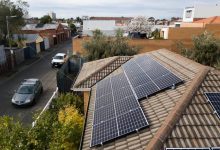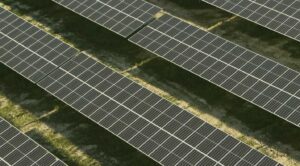Solar households are outraged. There is no other way to describe it. The very idea of a tax on solar power sent by rooftop systems to the grid is untenable to most, particularly in the midst of a clean energy transition where the massive uptake of rooftop solar is one of the few success stories.
The issue is on the front page of many newspapers, and hot on the airwaves. I was talking on ABC Radio Canberra on Friday morning and solar householders were not happy.
“I feel ripped off. The government has had 15 years to plan for solar contribution and the agencies did nothing,” said one.
“I feel conned … all those years of incentives and now a new tax,” said another.
“It is simply a money grab. We are already paying for poles and wires in our electricity bill,” added a third.
And finally: “Why would we stifle our key response to global warming?” asked another.
And solar households have every right to feel aggrieved. They have invested thousands of dollars individually and tens of billions collectively in rooftop solar to save money, reduce emissions, and help accelerate the transition to a zero carbon grid. It has been a resounding success.
The huge uptake in rooftop solar – now 12GW on 2.6 million homes and businesses and rising fast – has contributed to a big fall in wholesale prices, meaning lower electricity prices for all, and is hastening the exit of dirty old coal fired power stations and forcing the utilities to finally embrace the energy transition and upturn their business models.
AGL, for instance, is about to launch a new strategy that may see it split its businesses in two, green and dirty. EnergyAustralia has announced the early closure of Yallourn and others will follow; and all big retailers are scrambling to engage with consumers on rooftop solar, battery storage and electric cars.
In other words, at a time when governments and the energy incumbents have been slow to act, people power has forced change, and forced a pace of change and a transition that was unimaginable – at least to the incumbents attached to their rivers of gold from coal generation – just a few years ago.
The rooftop solar revolution is also forcing regulators and rule-makers to go back to the drawing board to re-design and re-imagine the electricity grid and re-write the electricity rules. Let’s hope they remember this time to include the environment in their considerations (they excluded it when the rules of the National Electricity Market were first drawn up more than two decades ago, which is one of the reasons why the industry has been so slow to respond).
But why a solar tax? And why now? The truth is that networks, and the rule-makers have been pushing for a rooftop solar tax for many years. They initially wanted a blanket fee on all exports, but have been beaten back and forced into a compromise position.
The consumer groups that support the solar tax say they this is a way to eliminate an even bigger problem for solar households, particularly those looking to install new systems or expand existing ones. And that problem is about solar exports: tens of thousands of solar households are being told that they will not be able to export any power back to the grid, or are severely restricted, because of so-called grid congestion.
These consumer groups say that the quid pro quo for the solar tax is the requirement that the networks will remove all impediments and restrictions on exports. And they argue the cost of network investment and upgrades needed to ensure this is not that much – maybe just 3 per cent of total annual expenditure – so any impost on solar households will not be big enough to spoil the investment in rooftop systems.
The 250-page document produced by the Australian Energy Market Commission, the rule-maker which has put forward this draft proposal, supports this position, saying that if the cost of the necessary upgrades were smeared across all consumers, including those without solar, it would amount to just $14 a year, or about four cents a day.
In their economic thinking, that is too much to ask, so the burden should fall on solar households. But because the cost is so little, then the impact on solar households will not be great and may, in the end, only impact those with really big systems who still want to export lots of solar power back into the grid in the middle of the day.
In any case, it may be years before the taxes are imposed, even if they are approved. There appears to be a right of veto by state and territory governments, any packages will have to be negotiated by networks and industry and consumer groups, and then be approved by the Australian Energy Regulator. It will take forever.
For others though, it is a matter of principal. “Why not demand that networks guarantee a minimum injection of 5 kW (as I say they guarantee at least 10 kW for withdrawal),” says Bruce Mountain from the Victorian Energy Policy Centre. “If the networks reckon I am wrong, let’s see the evidence.”
“Why should solar homes and small businesses get slogged with a charge when large coal and gas generators get a pass for exporting their dirty energy to the grid?” says the advocacy group Solar Citizens.
What is clear is that this issue has divided the solar industry like no other. Some are dead against, others are supportive, but with plenty of caveats and a desire to see more detail.
Jack Gilding, from the Tasmania Renewable Energy Alliance, thinks it’s a dumb idea, but probably won’t end up costing too much. In fact, in Tasmania it probably won’t cost anything at all, because the grid “congestion” from rooftop solar simply doesn’t exist.
“Punishing solar owners with extra charges is a misguided way to fund changes that need to be made to upgrade the distribution network,” he notes. “It is also discriminatory. Large power stations are not charged to use the network to export power, neither should solar owners.”
Gilding says there many positive ways of encouraging consumers to invest in new technology and change their behaviour in ways that benefit all consumers. These include time-of-use tariffs, better feed-in tariffs and virtual power plants.
“Charging consumers for feeding energy into the grid sends the wrong message at a time when we need to be maximising the use of renewable energy.”
See also:
Solar tax: Networks able to charge households to export solar power to the grid
No biggie or bin job? Solar advocates react to export tax proposal
Is rooftop solar really causing a network bottleneck?
Modelling: How the proposed rooftop solar tax will affect solar households








